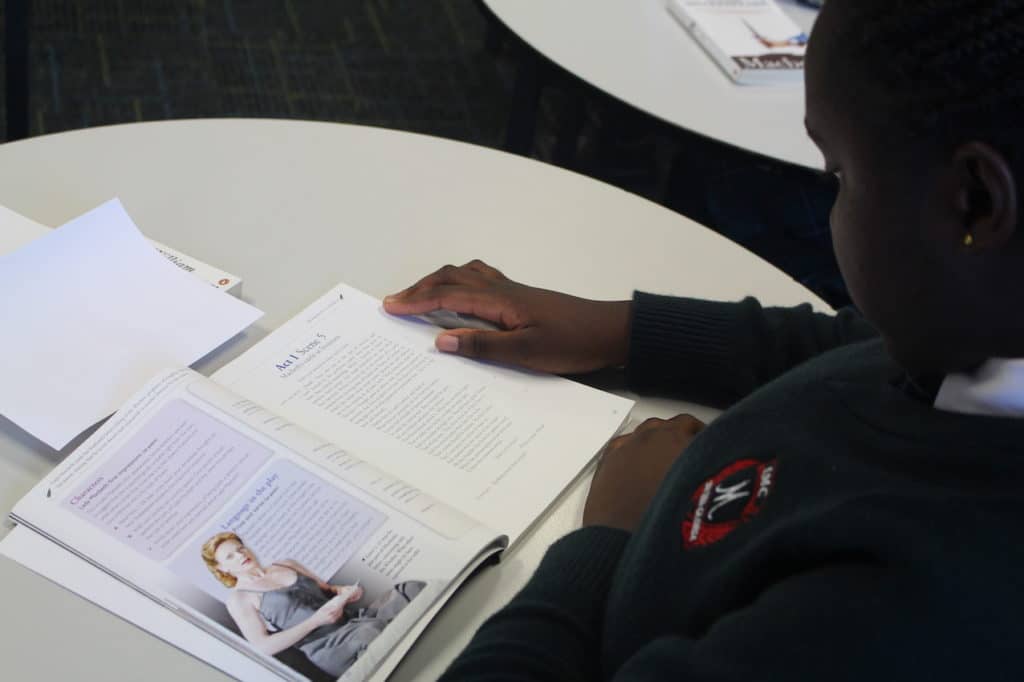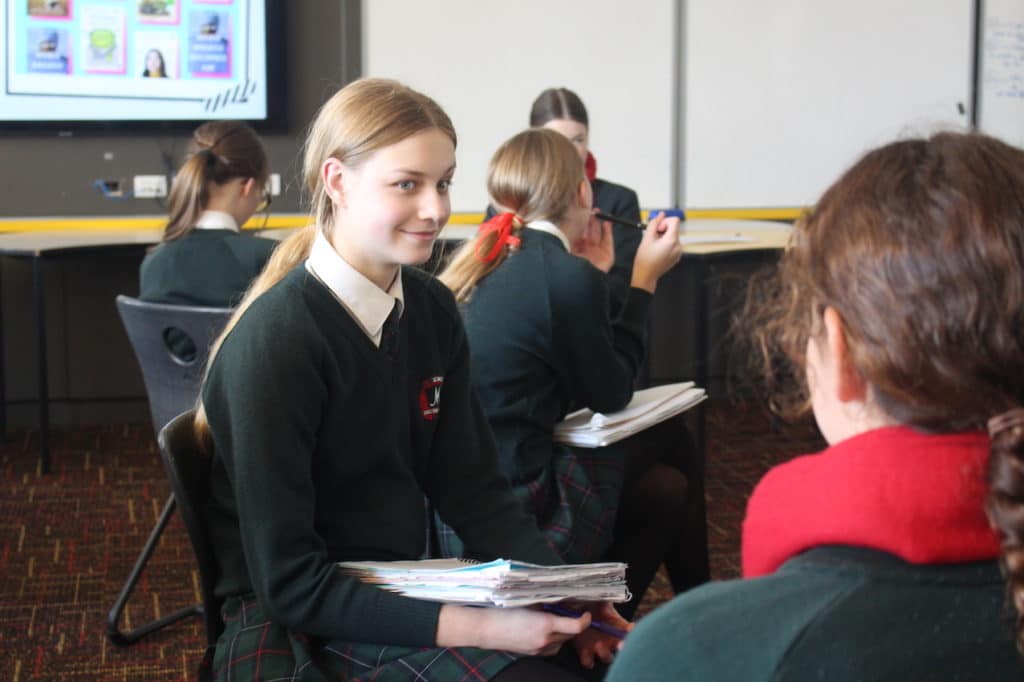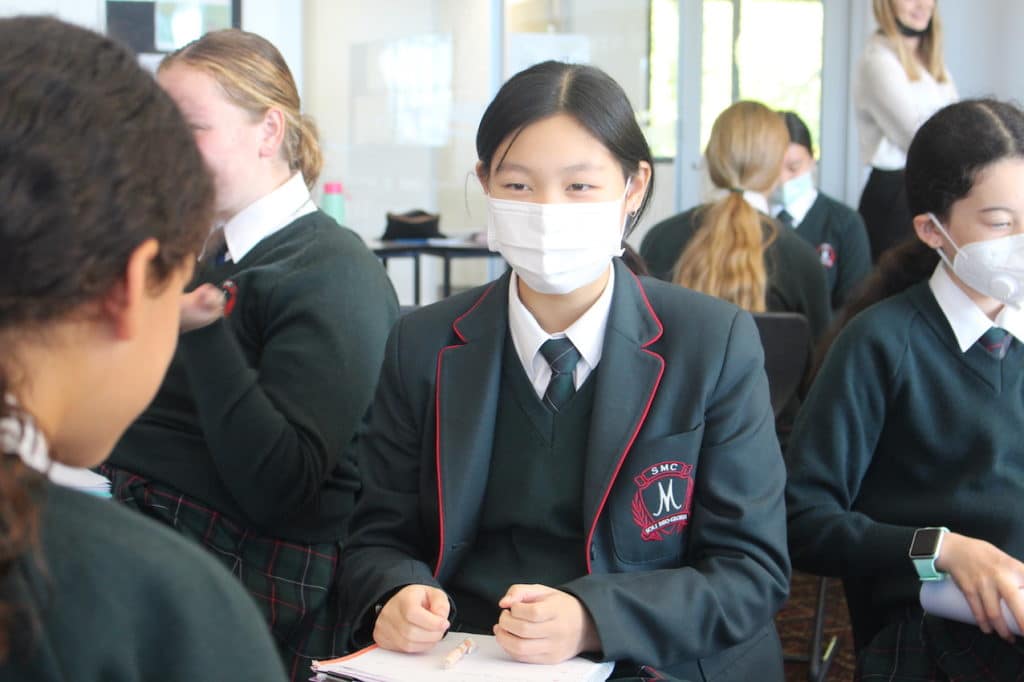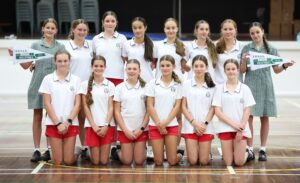From Shakespeare to Midnight Oil

While our Years 11 and 12 students are busy with exams and preparing for workplace learning, lots of exciting learning is happening in the English classrooms in Years 7-10 here at Santa Maria.
The English staff are passionate and dedicated teachers who genuinely love their subject. We are fortunate to introduce a range of texts and exciting ideas for students to ponder and discuss daily. It is most definitely a subject that provides challenges and promotes creativity and critical thinking in our students.
This year, each year group has been focussing on the following:
Year 7
The Year 7s have been studying song lyrics from Australian classics such as ‘Beds are Burning’ by Midnight Oil and ‘Took the Children Away’ by Archie Roach. They have been learning how songwriters use language features such as similes and metaphors to communicate ideas.
“In English this term, we have been learning about the first nations of Australia. In this unit, I have enjoyed learning about Indigenous culture and their traditions.” Claudia Taylor-Beard
“In English this term, we looked at the First nation owners. We looked at the songs Treaty, Solid Rock, Beds are Burning and Took the Children Away. These songs are about different parts of Australia’s history and what happened to indigenous people.” Rutendo Ngoma

Year 8
The Year 8s have been exploring autobiographical texts and considering how language features and storytelling devices operate in these texts. They have read and analysed extracts from ‘Ugly’ by Robert Hoge and ‘Lion’ by Saroo Brierley. They have also written their own persuasive speeches and delivered them to their class.
“I have enjoyed doing a speech and choosing what topic we could do as it meant we could do a topic important to us.” Angela Ross
“Something that I have enjoyed in English this year was writing speeches. Doing these speeches allowed me to express a topic that was quite close to home for me.” Amelia Cobley

Year 9
This year group have been composing their own narratives. The topic of their stories is assimilation and segregation. After reading a collection of stories and poems that presented this theme in Term 1, they have been bravely attempting their own creative pieces.
“We have been focussing on short story writing and the topics of segregation and assimilation. Before starting our narratives, we learned about these two terms and dove deeper into their meanings, looking at examples from other writers such as ‘All Summer in a day‘ by Ray Bradbury and ‘Neighbours‘ by Tim Winton. We started our individual narratives towards the end of Term 1 and leading into Term 2. We wrote stories about a wide variety of topics such as the stolen generation, racism in America and even body image. It has brought the year group much joy to learn and research these themes and topics.’ Ruby Mastaglia
“In Year 9 English this year, we have explored Australian poetry and creative texts and how they can portray segregation and assimilation. I always think that analytical writing is a bit like a murder mystery case. It’s interesting to unpack all the different meanings behind language features and ultimately uncover what the author is trying to show us as readers. It’s been cool to delve deeply into these topics in our creative writing tasks. It’s given many Year 9s a deeper understanding of inequality in the world and even under our own noses.’ Helen Smith

Year 10
‘All hail Macbeth!’ The Year 10s have just commenced a unit of work on the Scottish play, Shakespeare’s Macbeth. They are learning about the fascinating historical context of Shakespeare’s time and navigating the language and themes of the play. Despite its age, Macbeth remains relevant and is often referred to as one of the most enjoyable texts covered in the Year 10 course by our students.
“In English, we are studying Shakespeare’s famous tragedy, ‘Macbeth‘ and learning how to fully understand the themes through the unique language and techniques used. Through reading aloud and watching scenes of the play, we learn how Shakespeare’s words have shaped our language.” Lyla Fievez

Santa Maria Teams Shine in Term 1 Sports
Santa Maria had a huge number of girls in the IGSSA AFL and Volleyball competition with strong results for a number of teams.

Lee-Elle’s Insights from the ‘Make it 16’ Forum
Lee-Elle Cooper is a passionate Year 12 student who advocates for youth engagement and political participation. She has recently returned from the Make It 16 Forum in Canberra.

With Laurissa Knowles From Valley Depths to Mountain Peaks (1993)
Laurissa Knowles (1993) has had an incredible career journey so far, from Santa Maria College Teacher to Celebrant and Councillor.
- ConnectingLearning2Life, Creativity, Curiosity, Featured, Learning4Life
Author: Santa Maria College
Santa Maria College is a vibrant girls school with a growing local presence and reputation. Our Mission is to educate young Mercy women who act with courage and compassion to enrich our world. Santa Maria College is located in Attadale in Western Australia, 16 km from the Perth CBD. We offer a Catholic education for girls in Years 5 – 12 and have 1300 students, including 152 boarders.







